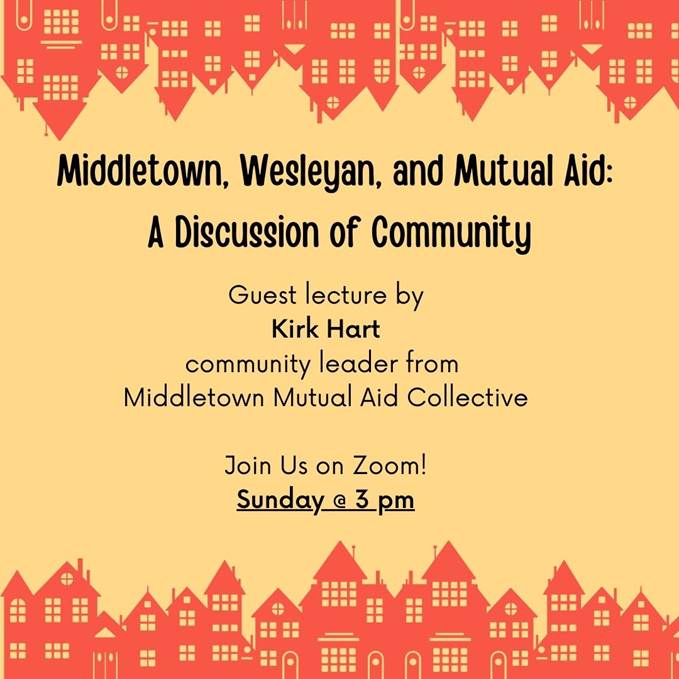
c/o Maya Verghese and Peter Fulweiler
A series of talks pertaining to the Middletown Mutual Aid Collective (MMAC) began this past Sunday, Feb. 21, over Zoom. Sunday’s event commenced with a guest lecture from MMAC member and Middletown resident Kirk Hart, who began by discussing the nature of mutual aid. After Hart’s lecture, there was a community discussion regarding Wesleyan’s role in mutual aid, the importance of ideology, and the intricate details of running the MMAC and the community fridge. It was concluded with a call to action for Wesleyan students.
“It’s about the community fridge and its role in general issues of food waste, and then combating food waste as well as food insecurity, which is definitely linked to environmental racism and policies,” MMAC member Ren Davidson ‘21 said.
Wesleyan’s Green Fund, which supports sustainability projects on campus, has financed the series of MMAC talks. The North End Action Team (NEAT) and WesNEAT looked for members of the community who were deeply involved with food justice in Middletown and the community fridge in order to find speakers for the series. They were connected to this project via Eco Facilitators. Using the Green Fund grant, Eco Facilitators were able to both secure money for the fridge and to pay the speakers of these events.
In addition to the overarching theme of food justice and sustainability in Middletown, Hart stressed the impact the community has on the University.
“I wanted to get the point across that the community affects the culture of Wesleyan, which then sort of drives the University and how it makes decisions and where resources go,” Hart said.
This push to create a bridge between Middletown and the University stems from Hart’s personal connection to both.
“At the very beginning of my life, my mother was a Wesleyan student who needed housing for her and her young son,” Hart said.
This connection transformed his life and led to him staying in Middletown, where he eventually became a member of the MMAC.
The community discussion part of the talk centered around the role of Wesleyan students and the University in communal aid. Commentary about how students should be involved filled the chat.
“Whatever you are comfortable with! Core organizing and leadership provided by our Wes womyn and non-binary members and big props to WesNEAT,” wrote MMAC and NEAT member and Middletown resident, Dmitri D’Alessandro.
On the other hand, there is controversy over the nature of University student’s help in Middletown.
“Wesleyan student involvement is great, as long as [the] savior complex is at the front of our minds always,” wrote MMAC member and Middletown resident Paige Petit wrote.
This idea of a “savior complex” clouding the actions of Wesleyan students surfaced in many conversations the MMAC have been having about aid, as well as in the talks themselves. The aim of this series is to show students how they can get involved within the town, but also to inform them about the thought process and the politics behind the organization.
“I think that there are a lot of really positive points of engagement that Wesleyan has with Middletown,” Davidson said. “But they’re all formalized to be things that students can put on their resumé as public service, as volunteering, as something that is in some way self-congratulatory. Whereas Middletown mutual aid, or the premise of mutual aid in general, is to commit to building a different structure of engagement, a different structure of care and of resources.”
Due to the complex relationship between student involvement and MMAC, more dialogues will be carried out over the course of the semester, with different speakers from the collective and possibly other organizers from around Connecticut.
“Middletown is a city, to the people that live in it,” Davidson said. “And our campus bubble is, in fact, a bubble, and engagement with Middletown needs to be done out of a genuine place of camaraderie and working together to build structures of engagement, rather than Wesleyan students building programs to then engage in Middletown.”
Editor’s Note: Maya Verghese ’23, who helped coordinate the MMAC talks, is the financial manager of The Argus.
Lia Franklin can be reached at lfranklin@wesleyan.edu.